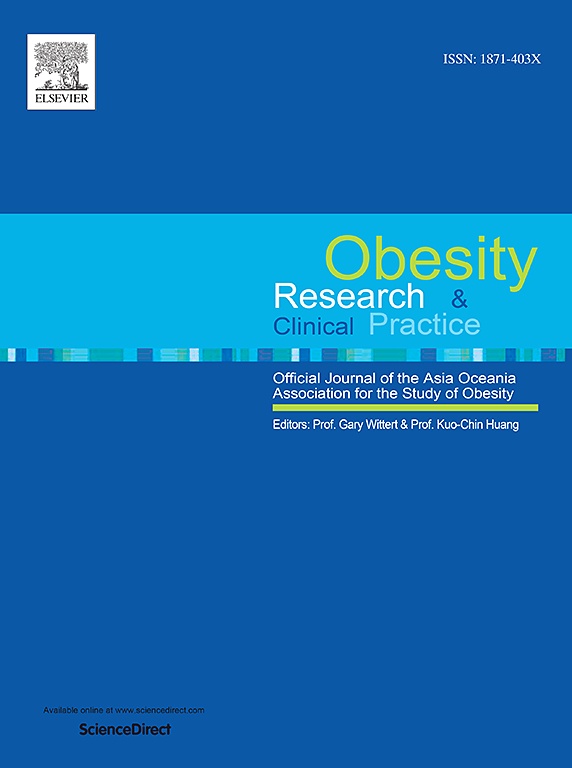Insights into diet, psychological distress, and personality traits among patients with lower-extremity lymphedema and overweight/obesity in comparison to patients with lifestyle-induced overweight/obesity and patients with normal body weight
IF 2.5
4区 医学
Q3 ENDOCRINOLOGY & METABOLISM
引用次数: 0
Abstract
Obesity is a leading cause of cardiovascular diseases. There are significant and mutual associations between lymphatic dysfunction and obesity. This case-control study aimed to compare nutrient intake, depressive symptoms, and Eysenck’s personality traits in patients with lower extremity lymphedema and overweight/obesity (n = 34) in comparison to patients with lifestyle-induced overweight/obesity (n = 30) and patients with normal body weight (n = 30). The study groups were evaluated using the Food Frequency Questionnaire (FFQ), Beck Depression Inventory-II, and Eysenck Personality Questionnaire-Revised (EPQ-R). Surprisingly, the study groups did not differ in any item in the FFQ, including total daily energy value and total intake of macronutrients, vitamins, or minerals. The group with lymphedema and overweight/obesity had higher scores on the depression scale, and the groups with lymphedema and overweight/obesity and lifestyle-induced overweight/obesity differed from the control group in Eysenck’s psychoticism score; however, in all study groups, the scores of this trait were within the normal range. In conclusion, our study suggests that when FFQ is used, the problem of under-reporting of usual dietary intake among patients with lower extremity lymphedema and overweight/obesity, and lifestyle-induced overweight/obesity should be considered.
对下肢淋巴水肿和超重/肥胖患者与生活方式引起的超重/肥胖患者和体重正常患者的饮食、心理困扰和人格特征的研究
肥胖是导致心血管疾病的主要原因。淋巴功能障碍与肥胖之间存在显著的相互关联。本病例对照研究旨在比较下肢淋巴水肿和超重/肥胖患者(n = 34)与生活方式引起的超重/肥胖患者(n = 30)和正常体重患者(n = 30)的营养摄入、抑郁症状和艾森克人格特征。采用食物频率问卷(FFQ)、贝克抑郁量表(Beck Depression Inventory-II)和艾森克人格量表(Eysenck Personality Questionnaire- revised, EPQ-R)对各研究组进行评估。令人惊讶的是,研究小组在FFQ的任何项目上都没有差异,包括每日总能量值和常量营养素、维生素或矿物质的总摄入量。淋巴水肿组和超重/肥胖组在抑郁量表上得分较高,淋巴水肿组和超重/肥胖组和生活方式所致超重/肥胖组在艾森克精神病评分上与对照组有差异;然而,在所有的研究小组中,这一特征的得分都在正常范围内。综上所述,我们的研究表明,当使用FFQ时,应考虑下肢淋巴水肿和超重/肥胖患者通常饮食摄入量的低报问题,以及生活方式引起的超重/肥胖问题。
本文章由计算机程序翻译,如有差异,请以英文原文为准。
求助全文
约1分钟内获得全文
求助全文
来源期刊

Obesity research & clinical practice
医学-内分泌学与代谢
CiteScore
7.10
自引率
0.00%
发文量
80
审稿时长
49 days
期刊介绍:
The aim of Obesity Research & Clinical Practice (ORCP) is to publish high quality clinical and basic research relating to the epidemiology, mechanism, complications and treatment of obesity and the complication of obesity. Studies relating to the Asia Oceania region are particularly welcome, given the increasing burden of obesity in Asia Pacific, compounded by specific regional population-based and genetic issues, and the devastating personal and economic consequences. The journal aims to expose health care practitioners, clinical researchers, basic scientists, epidemiologists, and public health officials in the region to all areas of obesity research and practice. In addition to original research the ORCP publishes reviews, patient reports, short communications, and letters to the editor (including comments on published papers). The proceedings and abstracts of the Annual Meeting of the Asia Oceania Association for the Study of Obesity is published as a supplement each year.
 求助内容:
求助内容: 应助结果提醒方式:
应助结果提醒方式:


